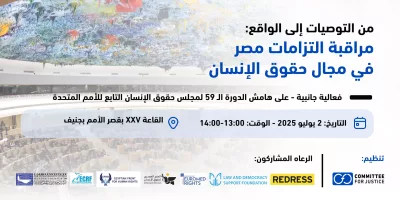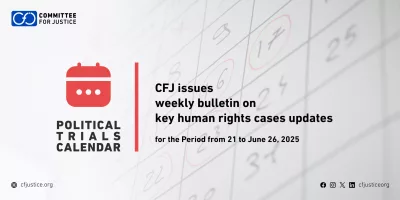Press Release
The Committee for Justice (CFJ) has observed an escalation in legal actions and judicial measures against political activists and lawyers in Tunisia, noting that authorities are implementing “arbitrary” measures that impinge on rights to expression and opinion.
This development follows the filing of a criminal complaint by the Electoral Commission with the Public Prosecutor at the Court of Appeal in Sfax against political activist and lawyer Abdelwahab Moater, citing his appearance on a television program on Zitouna TV, based on Decree 54 and Articles 125 and 128 of the Penal Code.
Calls to repeal presidential decree No. 54:
The complaint by the Electoral Commission against Moater coincides with increasing calls from Tunisian political parties, associations, and human rights activists to repeal Presidential Decree No. 54 of 2022, which pertains to combating information and communication system crimes. This decree has raised serious concerns among human rights circles and is viewed as a legal tool to restrict freedoms and target opposition voices in the country.
Lawyer Abdelwahab Moater, a constitutional law professor known for his opposition to the July 25 pathway and the institutions established as a result, is an active participant in the “Academic Petition” movement, which includes a group of law and political science professors and deans. This movement has voiced its rejection of the dissolution of the 2014 Constitution and the referendum on the 2022 Constitution, while also criticizing what it describes as a decline in rights to free expression, protest, and mobility.
CFJ condemns arbitrary measures:
The Committee for Justice expresses full support for lawyer Abdelwahab Moater, condemning the arbitrary actions against him for his views. The committee calls on Tunisian authorities to immediately halt the retaliatory legal actions against him, end the direct targeting of academic freedom, and stop infringing on the freedom of opinion and expression, rights which are protected by the Tunisian Constitution. CFJ emphasizes the need for authorities to adhere to their constitutional and international human rights obligations.






